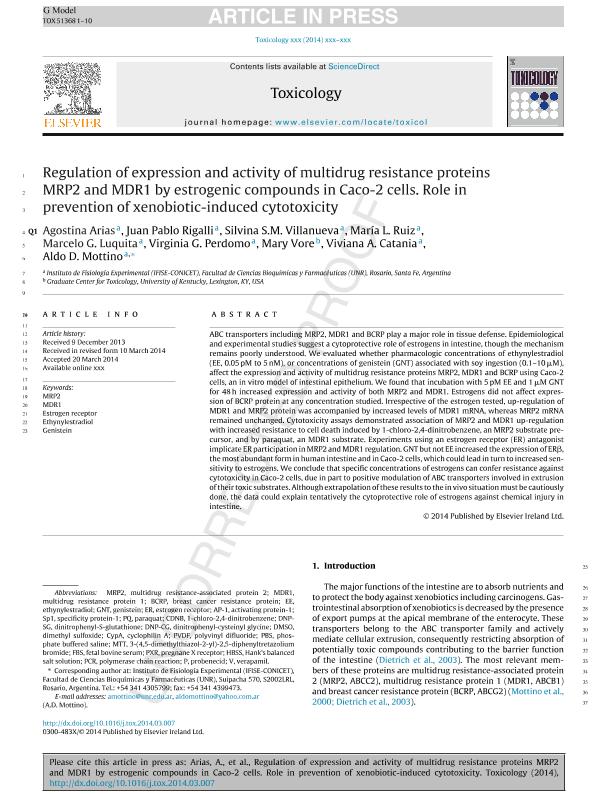Artículo
Regulation of expression and activity of multidrug resistance proteins MRP2 and MDR1 by estrogenic compounds in Caco-2 cells. Role in prevention of xenobiotic-induced cytotoxicity
Arias, Agostina ; Rigalli, Juan Pablo
; Rigalli, Juan Pablo ; Villanueva, Silvina Stella Maris
; Villanueva, Silvina Stella Maris ; Ruiz, Maria Laura
; Ruiz, Maria Laura ; Luquita, Marcelo Gabriel
; Luquita, Marcelo Gabriel ; Perdomo, Virginia
; Perdomo, Virginia ; Vore, Mary; Catania, Viviana Alicia
; Vore, Mary; Catania, Viviana Alicia ; Mottino, Aldo Domingo
; Mottino, Aldo Domingo
 ; Rigalli, Juan Pablo
; Rigalli, Juan Pablo ; Villanueva, Silvina Stella Maris
; Villanueva, Silvina Stella Maris ; Ruiz, Maria Laura
; Ruiz, Maria Laura ; Luquita, Marcelo Gabriel
; Luquita, Marcelo Gabriel ; Perdomo, Virginia
; Perdomo, Virginia ; Vore, Mary; Catania, Viviana Alicia
; Vore, Mary; Catania, Viviana Alicia ; Mottino, Aldo Domingo
; Mottino, Aldo Domingo
Fecha de publicación:
04/2014
Editorial:
Elsevier Ireland
Revista:
Toxicology
ISSN:
0300-483X
Idioma:
Inglés
Tipo de recurso:
Artículo publicado
Clasificación temática:
Resumen
ABC transporters including MRP2, MDR1 and BCRP play a major role in tissue defense. Epidemiological and experimental studies suggest a cytoprotective role of estrogens in intestine,though the mechanism remains poorly understood. We evaluated whether pharmacologic concentrations of ethynylestradiol (EE, 0.05 pM to 5 nM), or concentrations of genistein (GNT)associated with soy ingestion (0.1 to 10 µM), affect the expression and activity of multidrug resistance proteins MRP2, MDR1 and BCRP using Caco-2 cells, an in vitro model of intestinal epithelium. We found that incubation with 5 pM EE and 1 µM GNT for 48 h increased expression and activity of both MRP2 and MDR1. Estrogens did not affect expression of BCRP protein at any concentration studied. Irrespective of the estrogen tested, up-regulation of MDR1 and MRP2 protein was accompanied by increased levels of MDR1 mRNA, whereas MRP2 mRNA remained unchanged. Cytotoxicity assays demonstrated association of MRP2 and MDR1 up-regulation with increased resistance to cell death induced by 1-chloro-2,4-dinitrobenzene, an MRP2 substrate precursor, and by paraquat, an MDR1 substrate. Experiments using an estrogen receptor (ER) antagonist implicate ER participation in MRP2 and MDR1 regulation. GNT but not EE increased the expression of ERβ, the most abundant form in human intestine and in Caco-2 cells, which could lead in turn to increased sensitivity to estrogens. We conclude that specific concentrations of estrogens can confer resistance against cytotoxicity in Caco-2 cells, due in part to positive modulation of ABC transporters involved in extrusion of their toxic substrates. Although extrapolation of these results to the in vivo situation must be cautiously done, the data could explain tentatively the cytoprotective role of estrogens against chemical injury in intestine.
Palabras clave:
ESTROGEN RECEPTOR
,
ETHYNYLESTRADIOL
,
GENISTEIN
,
MDR1
,
MRP2
Archivos asociados
Licencia
Identificadores
Colecciones
Articulos(IFISE)
Articulos de INST.DE FISIOLOGIA EXPERIMENTAL (I)
Articulos de INST.DE FISIOLOGIA EXPERIMENTAL (I)
Citación
Arias, Agostina; Rigalli, Juan Pablo; Villanueva, Silvina Stella Maris; Ruiz, Maria Laura; Luquita, Marcelo Gabriel; et al.; Regulation of expression and activity of multidrug resistance proteins MRP2 and MDR1 by estrogenic compounds in Caco-2 cells. Role in prevention of xenobiotic-induced cytotoxicity; Elsevier Ireland; Toxicology; 320; 1; 4-2014; 46-55
Compartir
Altmétricas



